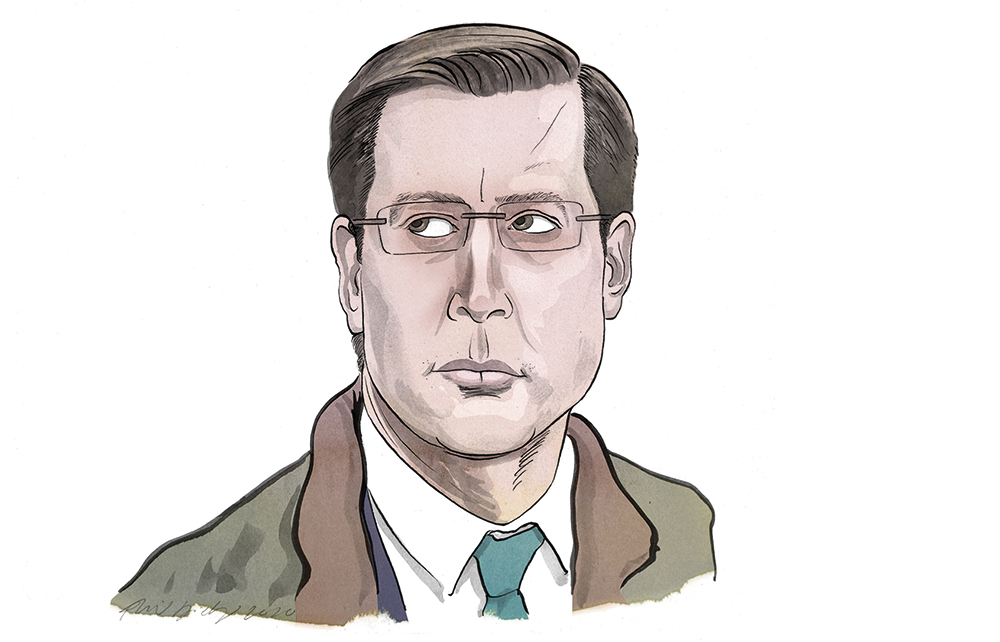When Simon Case was named as cabinet secretary in September 2020 he became, at the age of 41, the youngest appointee in more than 100 years. He will probably earn another distinction soon: the youngest ex-cabinet secretary in history. In Westminster, some say his departure is a question of when not if. Should he go this year, to allow a successor time to bed in, or wait until after the next election?
Case arrived at No. 10 in the middle of a pandemic, having never run a government department but boasting a PhD on Whitehall machinery written under the supervision of Peter Hennessy, Britain’s foremost living political historian and exponent of the ‘good chap’ theory of government. This holds that the letter of the rules is less important than the system being run by players who understand their spirit. But what happens when ‘good chaps’ serve a master who doesn’t play by the rules?
Case’s ‘original sin’, according to his defenders, was ‘being young and talented and promoted to that job before he was grey’. More accurately, his sin was being young, talented and promoted by Boris Johnson. Within months of his arrival, Case was embroiled in unorthodox schemes such as a plan to have a private donor pay for Downing Street’s refurbishments. His involvement in Richard Sharp’s nomination for chairman of the BBC remains a source of ongoing controversy, as does his knowledge of allegations about the conduct of Dominic Raab and Nadhim Zahawi.
Case previously served as Prince William’s private secretary. And it’s the charge of ‘courtier’ that has been flung at him as he has sought to balance the demands of being both cabinet secretary and the head of the civil service. Too often, his critics claim, he has served the ‘king’ at the expense of the country. ‘A fixer, not a leader,’ says one Whitehall veteran. There was fury at his apparent acquiescence in Johnson’s planned 91,000 job cuts and Liz Truss’s dismissal of Tom Scholar as the Treasury’s permanent secretary. His performance is held to have been a motivating factor in Sue Gray’s decision to defect to Labour, after he reportedly blocked her appointment as permanent secretary at the Department for Business and Trade.
Not all Case’s woes can be pinned on his political masters – especially his conduct during partygate. He was forced to recuse himself from leading the investigation into such gatherings in December 2021 after the revelation of his own attendance at a drinks party the previous Christmas. He also joined Johnson’s birthday celebration for which Johnson and Sunak received fixed penalty notices. Throughout it all, the No. 10 press office lied with impunity. Case justified this to MPs on the grounds that such conduct was ‘not automatically a breach of the civil service code’.
Matt Hancock’s leaked WhatsApp messages paint a picture of a dysfunctional government with Case at its heart. He emerges as a supposedly impartial mandarin who was too familiar with ministers and indiscreet in his language. He called quarantine measures ‘hilarious’, expressed a desire to ‘see the faces of people coming out of first class and into a Premier Inn shoe box’ and disparaged those in cabinet who promoted ‘pure Conservative ideology’. He also referred to the then prime minister as a ‘nationally distrusted figure’.
Case is already something of a survivor in the Whitehall jungle. Many tipped him to be sacked in September; instead, Tom Scholar got the boot, securing Case’s survival under Liz Truss and ensuring that there was no obvious candidate to replace him. Scholar’s replacement, James Bowler, is well respected but became head of the Treasury only in October. Tamara Finkelstein and Sarah Healey are strong contenders; both offer four years of service as a permanent secretary. Antonia Romeo would be a high-profile choice, while Sir Christopher Wormald and Sir Matthew Rycroft would be appointments more in line with the traditional ‘Sir Humphrey’ mould. The post could even be split, with the duties of cabinet secretary separated from that of the head of the civil service. Case’s difficulties to square the two roles have strengthened the case for such a change.
‘At the root of every aspect of intelligence practice is human judgment,’ wrote Case in his doctorate on post-war British intelligence. ‘Ultimately, those involved in any system requiring human input,’ he concluded, ‘must be always be [sic] aware of that system’s flaws.’ It is a tragedy for the civil service that a man so keenly aware of Whitehall’s frailties lacked the sound judgment needed to rectify them.







Comments